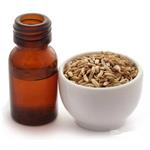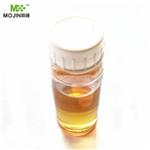Chemical Properties
The oil is obtained by steam distillation of the seeds Fennel sweet oil has a characteristic anise odor.
Chemical Properties
The oil is obtained by steam distillation of the dried, comminuted seeds in varying yields, usually from 2 5 to 6 5%, depending on the plant origin It has an aromatic, spicy odor and an initially slightly bitter, camphoraceous, then sweet, favor.
Chemical Properties
Fennel oil is obtained by steam distillation of the aerial parts of Foeniculum
vulgare Mill. ssp. vulgare var. vulgare (bitter fennel). It is a colorless to pale
yellow liquid with a camphoraceous, sweet–spicy odor and a slightly bittersweet
camphoraceous taste, d
2020 0.944–0.973; n
20D 1.514–1.538; α
20D +11 ° to +29 °.
The main constituents are monoterpene hydrocarbons such as ??-phellandrene
(0–8.5%) and limonene (1–6%), fenchone (10–25%), estragole (1–6%), and
(E)-anethole (50–78%). With increasing maturity of the fruits, the content
of monoterpenes decreases. The ripe fruits yield an oil with 50–70% anethole and
5–25% fenchone. In contrast, the oil of the ripe fruits of sweet fennel (F. vulgare
Mill. ssp. vulgare var. dulce) contains less than 5% fenchone and more than 75% anethole.
Fennel oil is produced mainly in Hungary, Tasmania, North Africa, and India
in a quantity of few 10 t/yr. In total. It is used in flavoring oral care products and
alcoholic beverages (anise liqueurs).
Physical properties
It is a yellowish-green liquid.
Physical properties
It is a colorless to pale-yellow liquid.
Occurrence
Found in the plant Foeniculum vulgare Thellung (Fam. Umbelliferae) (Guenther, 1950).
Uses
Flavoring agent in foods and pharmaceuticals. Fennel Oil can be used in eye washes and in facial steams to soothe and clean skin.
Definition
Extractives and their physically modified derivatives. Foeniculum vulgare, Umbelliferae.
Preparation
By steam distillation of the seeds of Foeniculum vulgare (Fenarolfs Handbook of Flavor Ingredients, 1971).
Essential oil composition
The main constituents of the oil include anethole, d-phellandrene and d-limonene.
Essential oil composition
The oil contains up to 90% trans-anethole and up to 20% fenchone and small amounts of limonene,
α-pinene, camphor and additional volatile compounds.
Safety Profile
Moderately toxic by
ingestion. Mutation data reported. A severe
skin irritant. When heated to decomposition
it emits acrid smoke and irritating fumes.




